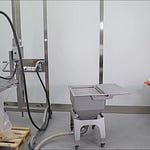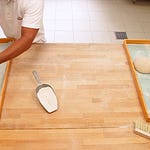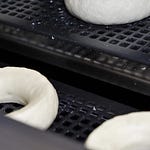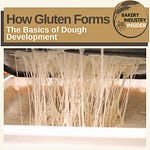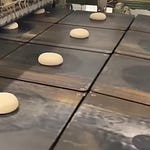Near-Infrared (NIR) spectroscopy is a real-time, non-destructive analytical technique used to instantly measure the composition of food materials. By projecting near-infrared light onto a product and analyzing the reflected wavelengths, NIR systems can quantify moisture, protein, fat, and other key constituents within seconds.
Inline NIR sensors are installed directly on the production line, typically above conveyors, in mixers, or at ovens. The system continuously scans the product stream and provides real-time data to plant control systems. This allows bakeries to move from traditional laboratory testing, which can take hours, to immediate, data-driven process control.
Applications Across the Bakery Line
NIR technology is applied at multiple stages of bakery production. Each one benefits from precise, automated monitoring that ensures consistency, efficiency, and compliance.
1. Flour Quality Control
In flour milling, inline NIR sensors monitor the quality of incoming grain and flour in real time. They measure key parameters like moisture, protein, ash, and gluten content as the material flows through grain intakes or conveying lines.
Technical advantages:
Continuous real-time analysis of flour quality without sampling.
High correlation with laboratory results for moisture and protein.
Immediate detection of deviations, enabling blending or conditioning adjustments on the spot.
Operational benefits:
Consistent flour properties reduce downstream process variability.
Optimization of milling parameters improves extraction yield.
Reduced waste and lower use of costly high-protein flour.
2. Dough Mixing and Processing
During dough formation, inline NIR ensures the correct hydration and ingredient balance. Sensors installed in continuous mixers, extruders, or batch systems measure dough moisture and composition in real time.
Technical advantages:
Instant feedback on dough hydration and ingredient ratios.
Closed-loop automation adjusts water addition automatically when deviations are detected.
Multi-parameter monitoring includes fat, sugar, or total flour-to-water ratio for complete dough profiling.
Economic and process benefits:
Eliminates out-of-spec dough before it reaches later stages.
Minimizes rework and raw material waste.
Ensures uniform fermentation and baking, improving final texture and yield.
3. Finished Product Control
At the end of the line, NIR sensors monitor moisture and other parameters in finished baked goods such as bread, cakes, cookies, and crackers. Positioned at the oven exit or cooling conveyor, they scan each product to verify that moisture remains within the optimal range.
Technical advantages:
Real-time monitoring of residual moisture and surface characteristics.
Automatic oven control adjustments prevent over- or under-baking.
Detection of subtle changes in texture or color, supporting uniform appearance and shelf stability.
Economic and quality benefits:
Reduces waste by preventing batches that are too moist or too dry.
Improves shelf life, weight consistency, and sensory properties.
Allows immediate product release without waiting for lab results.
Advantages of Inline NIR in Bakeries
The implementation of inline NIR across the production chain transforms bakery operations into a proactive, data-driven system.
Rapid Multi-Parameter Analysis: Provides near-instant measurements for critical quality attributes like moisture, protein, and ash, with accuracy comparable to laboratory tests.
Automation and Integration: Seamless integration with PLCs allows real-time process adjustments, reducing human error and ensuring continuous control.
Consistent Quality and Yield: Automated monitoring maintains uniform product characteristics, supporting zero-defect production and minimizing variability.
Resource and Cost Efficiency: Accurate control prevents raw material waste, lowers energy consumption, and reduces manual testing requirements.
Regulatory and Market Compliance: Provides verifiable data for labeling and quality standards, helping bakeries meet both internal and external compliance targets.
👉 Thanks for reading! 💬 Any experiences to share with us?? – We’d love to hear your story!
Sources: https://tinyurl.com/3c8rptwv




